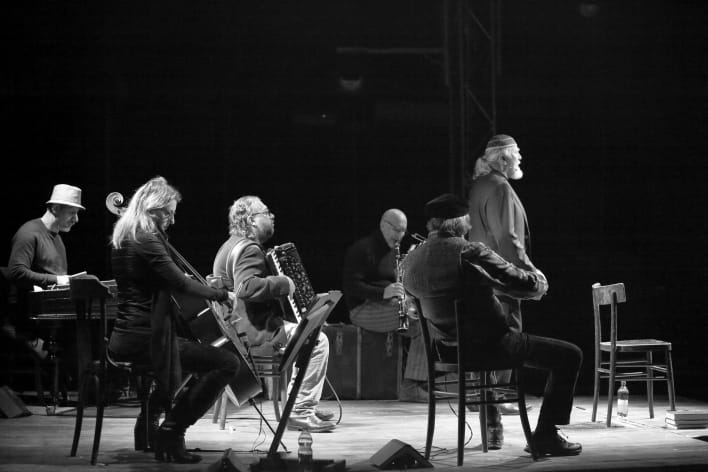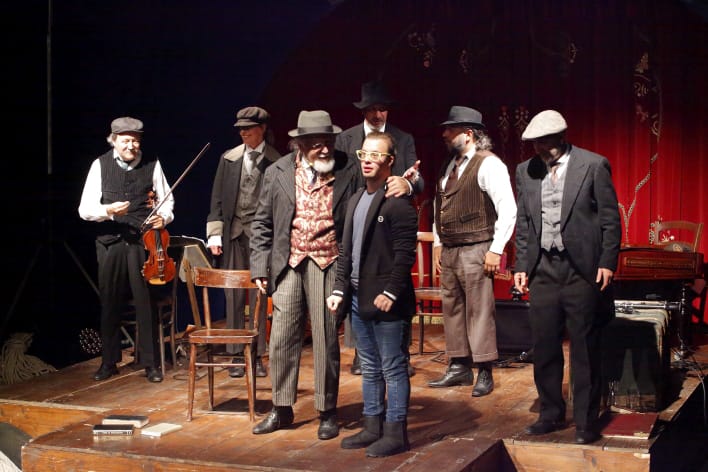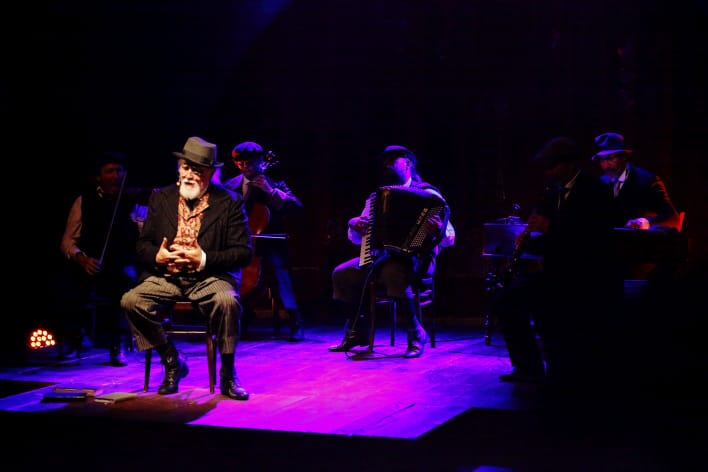On stage on 24 November in Artegna and then in Ferrara, Turin and Brescia, this cult show speaks of exile, vulnerability, human dignity, renewing the great Yiddish tradition
To celebrate the thirtieth anniversary of Oylem Goylem Moni Ovadia brings this acclaimed show back on stage which speaks of exile, of human reality, of vulnerability mixing cabaret, music, songs, stories. At the center is Yiddish culture and the Jewish diaspora. For the preview, the actor and director has chosen the Bolli circus of the Devlata Foundation in Sarzana, which deals with humanitarian activities and helps children with Down syndrome through culture and theater as a form of socializing. «I often come here – says Moni Ovadia a left – because a great friendship was created with Marina, president of the Devlata Foundation, and with her son Bolli to whom a beautiful chapiteau is dedicated. I dedicate my show to him.
Moni Ovadia, what was it like starting from here?
It was great to rehearse and debut in this space, as it has the ideal audience, with people of all ages. It seemed to have returned to the origins of this theatricality coming from the Yiddish world thanks to this circus tent. A chapiteau was precisely the place where, in Romania, Abraham Goldfaden, father of the Yiddish theatre, conceived his theater of exile, while there was the Russo-Turkish war (1877-1878) and many Jews had flowed into the country both as soldiers, both as small and large tradesmen. Just in that climate Abraham Goldfaden sat down in a circus tent. He asked the people he met if they knew any stories or songs. So he began to collect many materials contributing to the birth of the Yiddish theater which then had a few decades of great success and development before the catastrophe of the Shoah.
But then there are those who wanted to resume that extraordinary tradition.
Yes, so much so that today there are still actors, in every part of the world, who want to continue this tradition to which, among other things, a fiction completely in Yiddish has also been dedicated. It is a world that sends flashes of life despite the fact that the language is now twilight.
Oylem Goylem it is a show born from many experiences that have inspired her. Shall we go over some of them?
I had a musical group called International Folk Group, which revived traditional and international music. Later it changed shape because our musical genre was contaminated by others, thus ending up doing theatrical concerts as well. Traveling around Europe with our shows, I happened to meet singular experiences that influenced me a lot. One of these was that of a group/band of university professors from Frankfurt, they were musicians, specialized in brass, but also amateurs masterfully coordinated by the great musician Heiner Goebbels, who later became one of the greatest European composers . The group formed an orchestra called “Sogenanntes linksradikales blasorchester”, in Italian it could be called the wind orchestra of the so-called left radicals. This orchestra made musical parodies and clownery, which were very funny but never lacking in some provocations. Later I got to meet the Willem Breuker Kollektief, a Dutch musical group of jazz musicians. They too did clownery, surreal gags and funny theatrical numbers. Also thanks to the influence of these experiences, the idea of being able to give life to a new theatrical figure was born.
With the figure of the musician who also becomes an actor?
Exactly, my idea was to create a figure of theatrical dramaturgy. Unlike the examples I had encountered, I cultivated this idea of the musician actor not only to use it in the humorous and comical dimension but also in the lyrical and dramatic. The figure of the actor musician must not be mistaken for that of the actor who plays an instrument. I thought of a musician who becomes an actor through an intimate relationship with his instrument, and also thanks to his body postures, gestures and facial expressions.

Definitely the show I did on mothers with the subtitle The twilight of mothers, which had been suggested to me by the arrival of Dolly the sheep born from cloning, so in my mind I wondered if they were really going to replace childbirth with cloning, but of course that was hyperbole. I built a show out of it, which I consider stylistically my most important. Then I did Dibujo, a show on the Holocaust where the musicians and actors represent the orchestra of the concentration camp, and two actors embody men and women deported to the concentration camp. I played the sole survivor, who picked up the impulses of this memory. This figure belongs to the mystical/legendary dimension of the Jewish world of central-eastern Europe. This character is a violent and premature death, who returns to possess a living one because he could not have a death worthy of a human being, therefore with the comfort of his loved ones. However, the fate of the dead of the Holocaust was not this, because as we know they had horrible deaths.
And so we come to the show Oylem Goylem, which has had many awards and dedicated books. How do you feel about bringing it back on stage?
It makes me very happy to take it up again thirty years later thanks to a co-production by the Brescian Theater Center and Corvino Produzioni (although I have never stopped bringing it on stage with more than a thousand shows all over the world). Clearly some things have changed, the years have gone by, we have added new sonorities, my stories move in a different way, and for the first time in a group always made up only of men there is finally a woman, the cellist Giovanna Famulari who she is a stellar musician. Despite the years, the compass always remains that of the poster Oylem Goylem, therefore to glorify exile as a condition of splendor of the fragile human being that reveals his greatness.

Shmuel Atzmon credited me for ridding post-war and post-catastrophe Yiddish of overly nostalgic and celebratory elements. I try to make a theater for today and for tomorrow and this is demonstrated by the fact that in my shows the audience is very varied. Unfortunately, Yiddish theater has often been the representation of a nostalgic oleograph. I have tried to evaluate Yiddish culture as energy, matter, spirituality and depth, in order to use this extraordinary human and ethical expressive material for a theater of today and tomorrow.
Staying on the Yiddish theme, how would you define your form of humour?
Yiddish humor ushers in a dazzling form of thinking, paradoxical humorous thinking, but it’s not for laughing, laughter is a healthy and beautiful side effect.
How important is theater for teaching the Shoah, for breaking down prejudices and stereotypes not only against Jews but also against any form of minority or towards anyone who may be considered different from the standards of a given country?
The contribution of the theater is fundamental because there is nothing that can replace it. A living relationship is established between the spectators and the scenic event, and furthermore the performances can change depending on the condition of both the performers and the public. The theater also has a statute that makes it fundamental, and Gigi Proietti explains it well in two lines of his sonnet in Roman dialect entitled Long live the theatre, where in the first two verses it reads “Viva er teatro, dove è tutto finto, ma gnente c’è de farzo”. This is because the theater has “the piety” of fiction at its disposal, which allows it to say the most ruthless and most paradoxical things because it is protected by it. For example, the theater can tell the horror without whoever sees the horror being petrified by the face of the Medusa, because there is the pietas of fiction. From this point of view, the theater is the only real place of truth available to human beings.
November 24th at 20.45 Moni Ovadia presents the show at the New Lavaroni theater in Artegna for the opening of the 2022/2023 season of the Amici del teatro. From 25 to 27 at the Municipal Theater of Ferrara From 6th to 11th December he will be at the Limone Foundry Theatre of Moncalieri (Turin) Il 29, 30 and 31 December will be staged at the Teatro Sociale in Bresciaon the 31st with a toast with the spectators
Photo by Enrico Zappettini of the Devlata Foundation. The boy Moni Ovadia embraces is Bolli to whom the circus has been dedicated.
Andrea Vitello specializes in Holocaust teaching and graduated from Yad Vashem. He wrote the book, with a preface by Moni Ovadia, entitled THEThe Nazi who saved the Jews. Stories of courage and solidarity in Denmark, (Letters 2022). He writes for Pressenza and Left
Thirty years of Oylem Goylem. The Extraordinary Adventure of Yiddish Theater by Moni Ovadia | left

